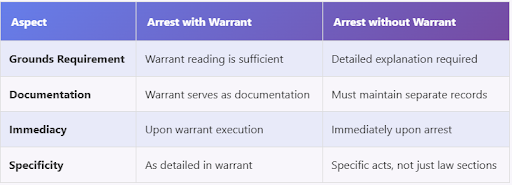



The Supreme Court, in Kasireddy Upender v. State of Andhra Pradesh, ruled that arrest warrants inherently contain grounds for arrest, satisfying Article 22(1) when read aloud. For warrantless arrests, police must immediately detail specific actions constituting the offense, not just cite laws, or risk violating Article 21. Police bear the burden of proving compliance.

Copyright infringement not intended
Picture Courtesy: TIMESOFINDIA
Supreme Court clarifies that arrest warrants suffice as grounds for arrest, separate explanation not needed.
The Supreme Court in the case Kasireddy Upender v/s State of Andhra Pradesh hears an appeal where the appellant claims his son’s arrest is illegal because police fail to provide the grounds of arrest as required by Article 22(1).
The appellant argues that this violates his son’s fundamental rights. After lower courts dismiss the plea, the case reaches the Supreme Court, which examines whether police must always provide a separate document or explanation for the grounds of arrest, even when a warrant exists.
Arrest with a Warrant => When police arrest someone based on a warrant, the warrant itself contains the reasons for the arrest. Reading the warrant aloud to the person is enough to meet the requirements of Article 22(1). No additional explanation or document is needed.
Arrest without a Warrant => If police arrest someone without a warrant, they must immediately inform the person of the specific reasons for the arrest. This includes detailing the exact actions the person took that include the offense, not just quoting the law or section under which they are charged.
Burden of Proof => If an arrested person claims police did not inform them of the grounds, the police must prove they followed Article 22(1). This might involve showing diary entries or other records that document the communication of the grounds. The Court emphasizes that these grounds must exist before the arrest and be clearly recorded.

Source:
|
PRACTICE QUESTION Q. Critically analyze the effectiveness of Lok Adalats in reducing the burden of pending cases in India. 150 words |






© 2026 iasgyan. All right reserved